Re-Emerging at Emmaus House
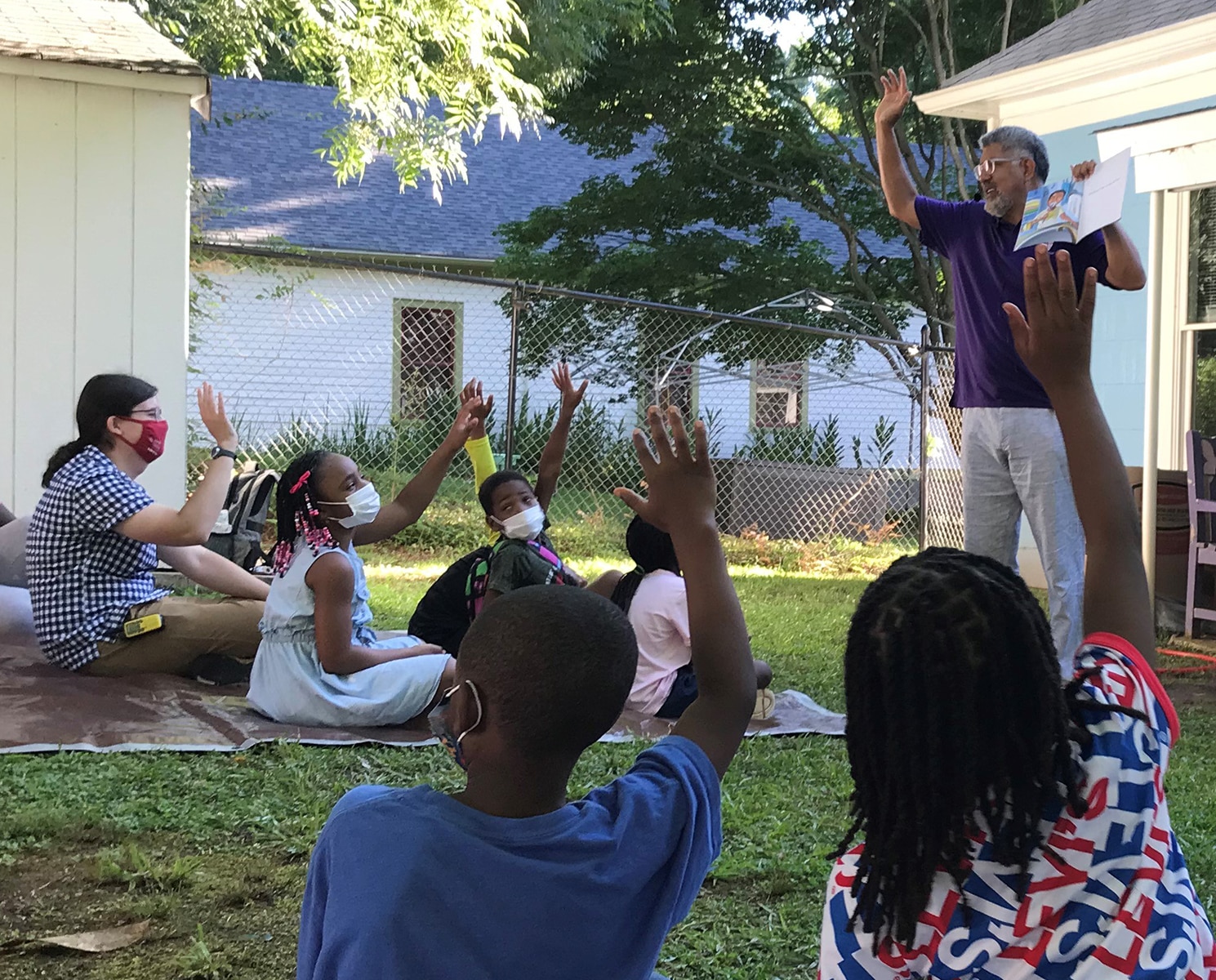
By Sara Evans
Grant Consultant, Emmaus House
Amari arrived at Emmaus House’s Freedom Schools with a great deal of hesitancy. He struggled to engage in discussion and activities in the classroom, and after months of virtual schooling, he struggled to communicate with his peers in ways that should have fostered positive and impactful relationships.
The 7-year-old achieved significant academic and social-emotional growth after participating in small groups focused on increasing literacy and developing language around how to express feelings, and he learned to implement self-regulation strategies by applying the yoga and meditation techniques he developed. Amari advanced from disengaging from his classes and peers to encouraging his peers and adding to thought-provoking class discussions.
The Emmaus House campus was again filled with students participating in the annual Children’s Defense Fund (CDF) Freedom Schools program this summer after 17 long months of virtual school, limited social interaction, and anxiety about the pandemic. Progress like Amari’s wouldn’t be possible without the support of Coaching for Literacy, which supplies the critical infrastructure for this programming.
Since 2015, with the exception of last summer due to the pandemic, CDF Freedom Schools has provided a haven of support, love, and learning for elementary-aged students living in the Peoplestown neighborhood and surrounding communities, located a mile south of downtown Atlanta.
The six-week literacy and cultural enrichment program is designed to serve children in communities where quality academic enrichment programming is limited, expensive, or nonexistent. The program enhances children’s motivation to read, connects families to resources, and has been a critical resource for residents in and around Peoplestown even before the pandemic impacted learning loss.
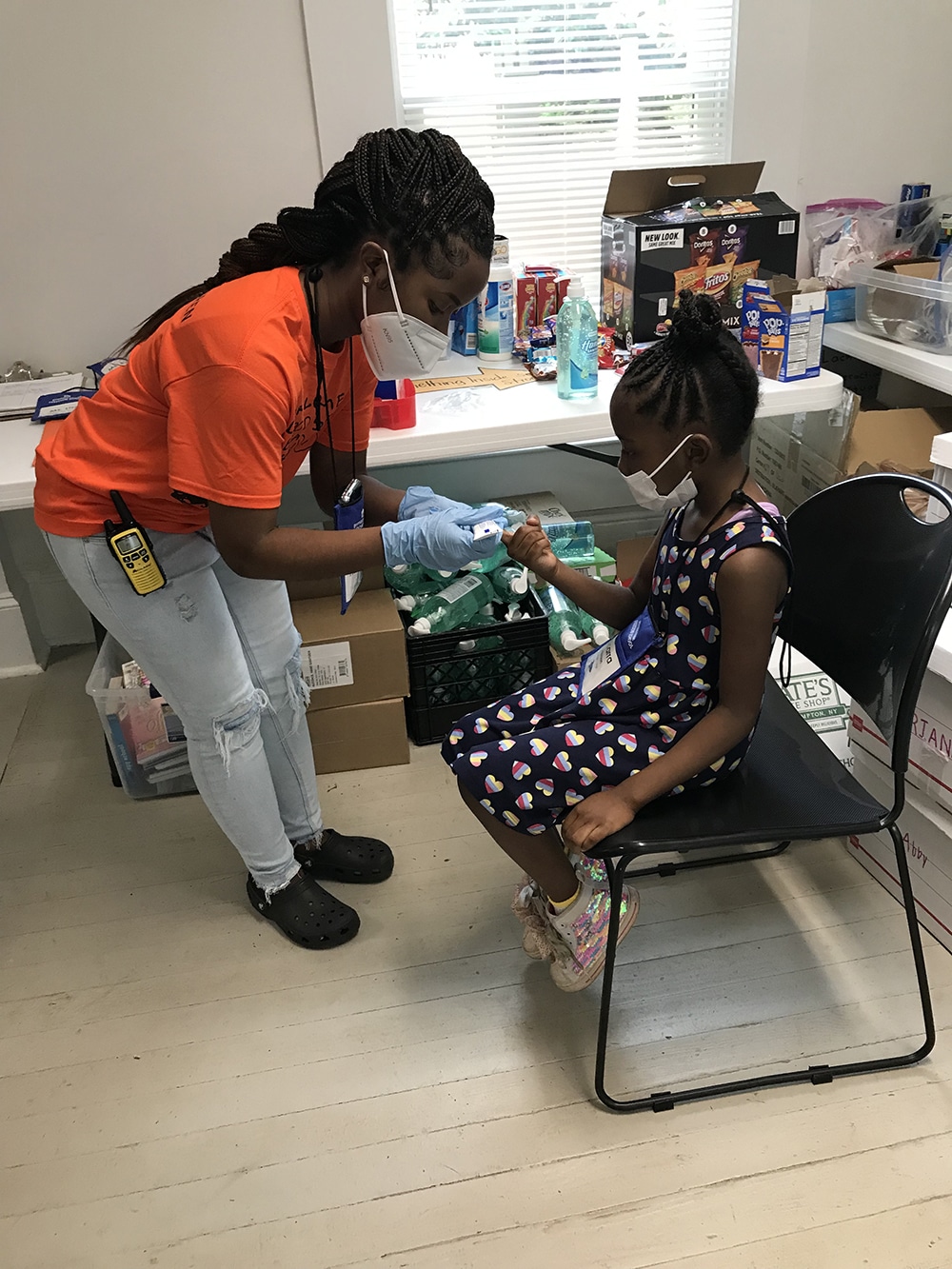
Final assessments for Emmaus House’s CDF Freedom Schools consistently show that nearly 85% of students tested via the Basic Reading Inventory maintain or increase their reading level every summer.
Funding from Coaching for Literacy enabled Emmaus House, in partnership with the Get Georgia Reading—Campaign for Grade Level Reading, to transition the program to meet the educational and socio-emotional needs of K-3 children, funding critical supplies, training, books, and literacy kits.
Greater Need Than Ever to Close the Learning Gap
According to a report from McKinsey & Company in December of 2020, the pandemic set back learning for all students, with students of color an estimated 6 – 12 months behind in learning compared with 4 – 8 months for white students.
Georgia State University’s Metro Atlanta Policy Lab for Education released a report with the key takeaway that, on average, historically marginalized groups, such as Black and Hispanic students, tended to experience more significant reductions in achievement growth as a result of the pandemic.
Results of the Georgia Milestones standardized tests released this month found that Cobb and DeKalb counties saw double-digit increases in third-grade reading failure rates. Georgia’s overall scores reveal that the percentage of failing students rose by two to nine points across grade levels and subjects.
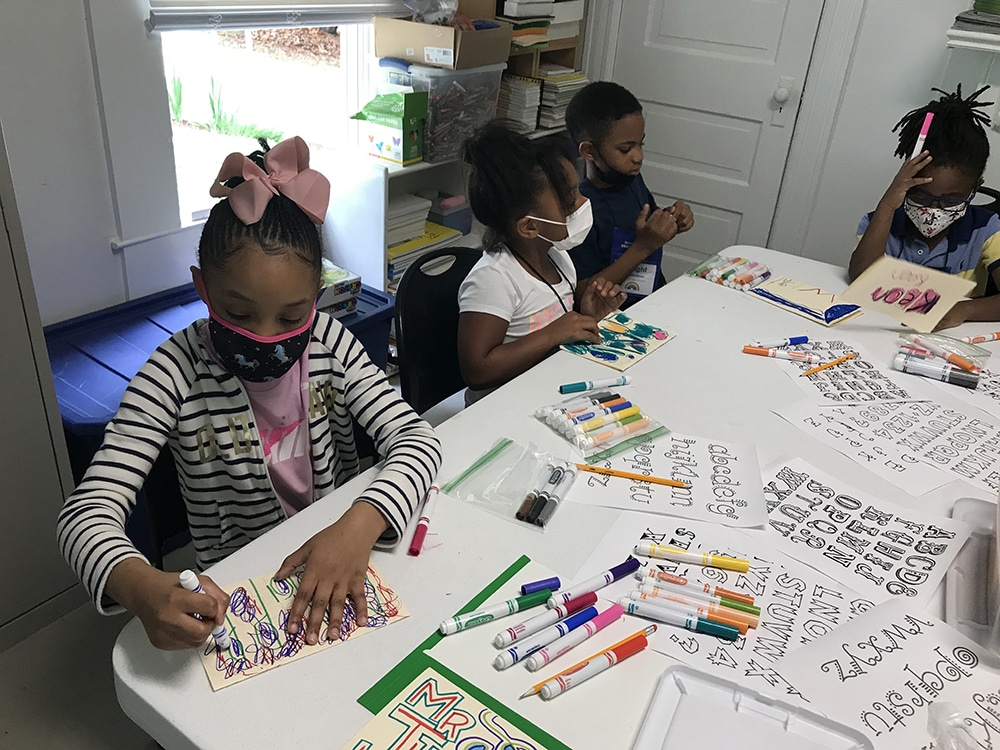
The learning loss gap historically experienced by marginalized students is not new for Peoplestown. The neighborhood, situated just south of the Georgia State Stadium, reports a median per capita income of $29,287, with just over one-third of legacy residents achieving high school graduation.
Demographically, the neighborhood is 80% black, 13% white, and 6% Hispanic. Over 90% of the children served in Emmaus House’s CDF Freedom Schools program are black and are eligible to receive free and reduced lunch. Breakfast, snacks, and lunch were provided to each student this summer, with an emphasis on nourishment as a vital component of the learning experience.
This program stands in the gap for those who already experience challenges in academic achievement. Due to months of COVID-19 restrictions, some kindergarteners and first graders had their first encounter with a structured in-person learning program on the Emmaus House campus. Because the site was smaller this summer, staff and volunteers were able to give extra academic help to students, which resulted in measurable academic growth. Initial program assessments indicate every scholar maintained or increased their reading levels, with a majority of those scholars increasing two to three grade levels.
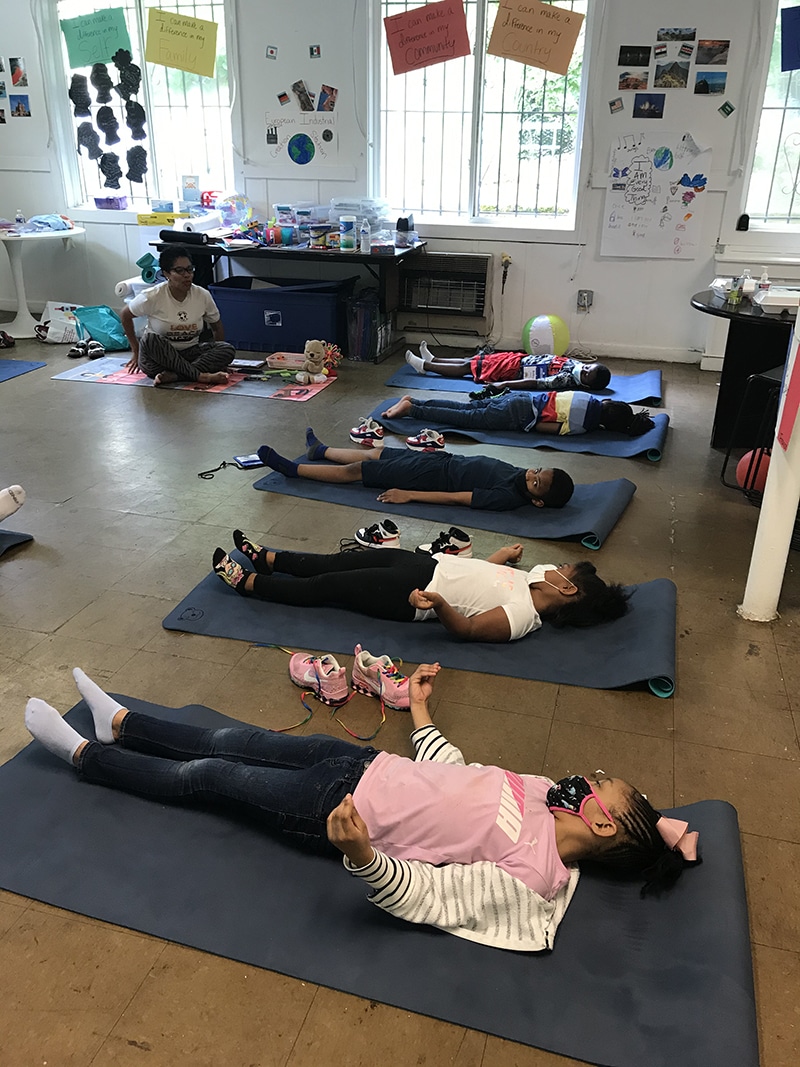
Attending to Social-Emotional Needs
This year, CDF Freedom Schools combined the usual literacy training with fun activities for K-5 children. This year’s curriculum featured intentional social-emotional learning led by two licensed school counselors, as well as a yoga and meditation class for scholars.
Emmaus House employed individualized care, mindfulness to scholars’ dispositions and needs, thoughtful engagement, compassionate redirection, and deep listening. The goal was to ensure that all scholars felt secure and safe—emotionally, physically, and mentally—at all times.
The “Thank You for Being Present Day” celebrated scholars for their presence and reinforced the importance of attendance. Books that helped promote social emotional learning by helping scholars regulate their emotions and practice mindfulness included Little Spot of Emotion, Little Spot Takes Action, and the Ninja Life Hacks series.
Children as Agents of Change
The National Day of Social Action focused on youth justice and critically deepened scholars’ acknowledgement of their ability to affect the trajectories of their own lives. Scholars engaged in reading, discussion, and activities related to their ability to initiate change. The morning Harambee program highlighted inequity with a reading of Let the Children March by Monica-Clark Robinson. Scholars learned about Ruby Bridges in art class and learned about revolutionary African American writers in drama class.
The Integrated Reading Curriculum introduced scholars to facts and data regarding the number of incarcerated youth in Georgia and scholars wrote letters to youth who once served time in juvenile correctional facilities and are on the path toward changing the trajectory of their lives. Scholars listened to stories from elders in the community who participated in the Civil Rights Movement and are advocates for social change.
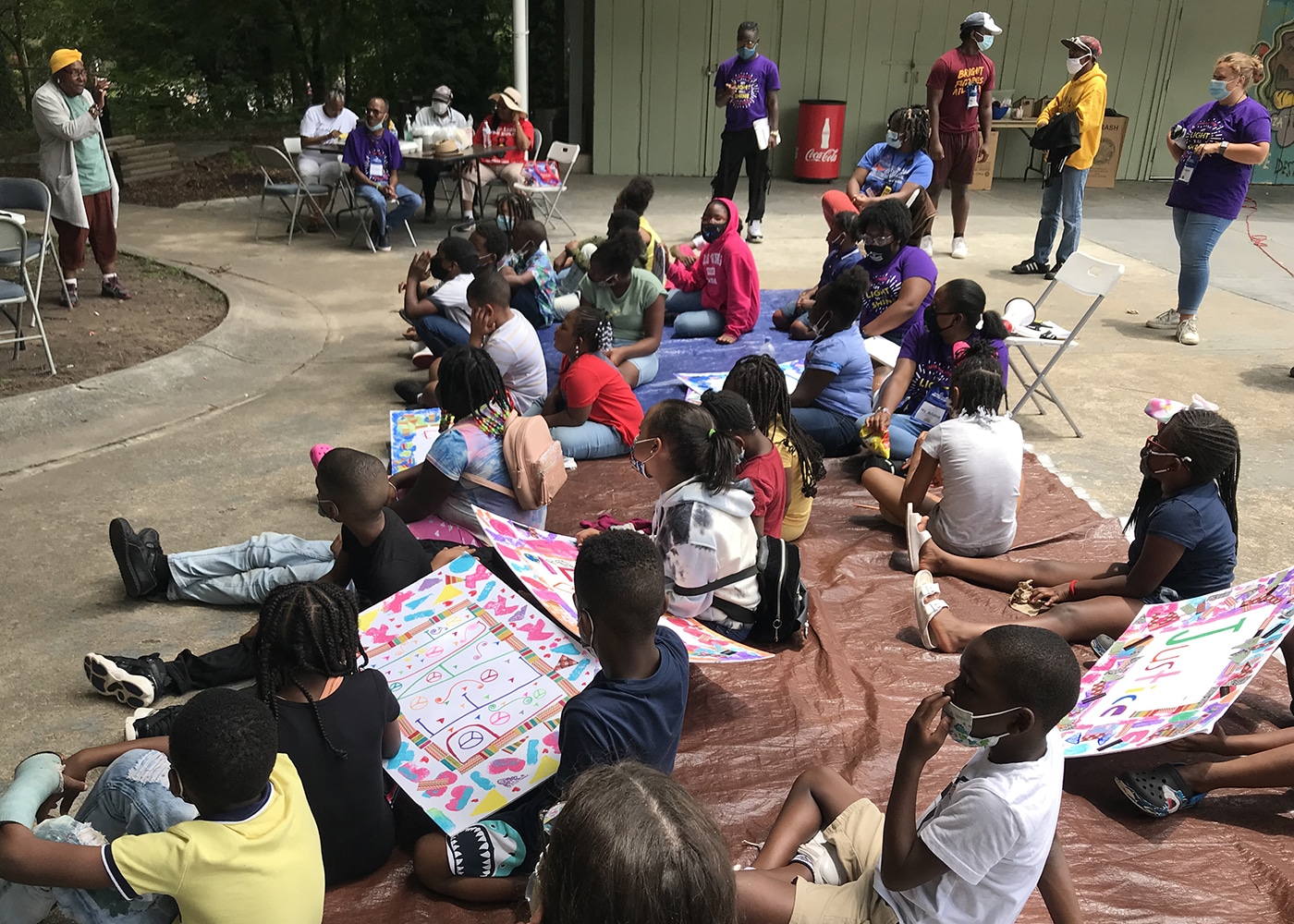
It’s a Family Affair
Freedom Schools summer programming impacts the entire family and the broader community. Not only are literacy skills vastly improved, but 98% of parents saw increased confidence in their children after 2020’s programming, which extends to academic subjects and activities outside the classroom, and 97% of parents were interested in engaging in social action with their children.
“Both my kids enjoyed attending Freedom School,” said Kwajelin Harris, who credits Emmaus House’s Freedom Schools for growth in many areas. “Reading is a weakness for my daughter, and she enjoyed ‘Drop Everything and Read’ time because she wants to get better. My son enjoys being a leader and helping as an assistant with the kids. My daughter and son have more open conversations at home about Freedom School.”
Tamika Cooper’s daughter enjoys Freedom Schools so much, they invited her cousins to participate with her this summer. “Freedom Schools excites our child, which in turn excites us,” said Cooper. “We look forward to next year.”
Ann Fowler, Emmaus House’s director of Education Services, is already planning another six weeks of whole-child enrichment that will change the lives of the children of Peoplestown next summer.
